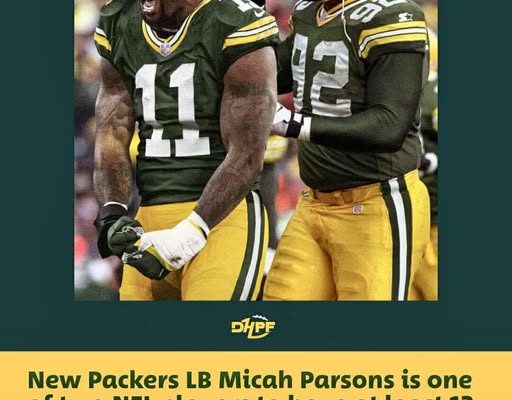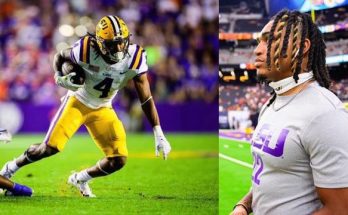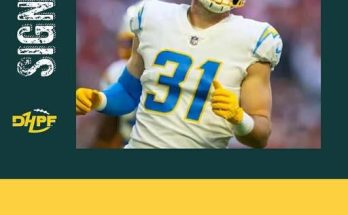The NFL landscape has once again been shaken to its core, and this time it’s a seismic shift involving one of the game’s most dominant defensive forces. According to ESPN sources, the Dallas Cowboys have agreed to trade three-time All-Pro linebacker Micah Parsons to the Green Bay Packers. In a deal that instantly rewrites both franchise history and the league’s salary benchmarks, Parsons and the Packers have reportedly agreed to terms on a massive four-year, $188 million contract, negotiated by powerhouse agent David Mulugheta of Athletes First. The deal includes a staggering $120 million guaranteed at signing, cementing Parsons as the highest-paid non-quarterback in NFL history. For fans, analysts, and players alike, the news is both shocking and exhilarating, a move that could alter the balance of power in the NFC for years to come.
The Cowboys’ decision to part ways with Parsons is as bold as it is controversial. Since being drafted in the first round in 2021, Parsons has been the heartbeat of Dallas’ defense, a relentless pass rusher with the versatility to dominate at linebacker, edge, or even in hybrid roles that only the most uniquely gifted athletes can handle. In just four seasons, he established himself as one of the league’s premier defenders, drawing comparisons to Lawrence Taylor and redefining what defensive coordinators believed was possible. Three All-Pro selections in four years speak for themselves; Parsons was not just a star, he was the identity of the Cowboys’ defensive unit.
So why move him? For Dallas, the answer is complex. Salary cap pressures have loomed large, especially as the franchise has committed big money to Dak Prescott, CeeDee Lamb, and Trevon Diggs. Keeping Parsons long-term would have required a record-setting contract, something the Cowboys’ front office appeared unwilling—or unable—to commit to given their other obligations. Reports suggest internal disagreements between owner Jerry Jones and the rest of the Cowboys’ front office regarding Parsons’ future. Ultimately, the Packers swooped in with an aggressive offer, both in trade value and financial commitment, signaling their intent to maximize their Super Bowl window.
For Green Bay, the acquisition represents a bold declaration. The Packers have traditionally been known as a franchise that builds through the draft and remains conservative in free agency and big-name trades. But this move defies that tradition. By landing Parsons, Green Bay immediately transforms its defense from solid to potentially elite, pairing the All-Pro linebacker with emerging stars like Rashan Gary, Jaire Alexander, and Quay Walker. With Jordan Love quickly establishing himself as the franchise quarterback and showing steady growth, the Packers are signaling that they are all-in on building a championship-caliber roster around their young leader.
The $188 million contract, with $120 million guaranteed, is a landmark deal in NFL economics. Until now, record-breaking contracts were largely reserved for quarterbacks. By elevating Parsons to this financial stratosphere, the Packers are not just rewarding his generational talent, they are reshaping the market for defensive players. No non-QB has ever commanded this kind of money, and the ripple effects across the league will be immediate. Top-tier defenders like Nick Bosa, T.J. Watt, and Myles Garrett have all reset the market in recent years, but Parsons has blown the ceiling wide open. It is now inevitable that other defensive superstars will look to push their negotiations closer to quarterback-level salaries, changing the calculus for teams trying to balance their rosters.
Parsons’ agent, David Mulugheta, deserves enormous credit for orchestrating both the trade and the historic deal. Known for representing some of the biggest names in the NFL—including Jalen Ramsey, Deshaun Watson, and Budda Baker—Mulugheta has developed a reputation as one of the most influential agents in professional sports. His ability to navigate the complexities of high-profile trades while securing maximum financial guarantees for his clients has made him a powerful figure in NFL circles. In Parsons’ case, Mulugheta leveraged his client’s rare talent, youth, and résumé to secure unprecedented terms, ensuring Parsons’ place not just in Green Bay’s lineup but in the financial record books.
From a football perspective, the fit between Parsons and the Packers is tantalizing. Defensive coordinator Jeff Hafley, who arrived in Green Bay with a reputation for creativity and aggression, now has the ultimate chess piece. Parsons can rush off the edge, drop into coverage, or even line up inside depending on matchups. His presence will command double teams, freeing up Gary and Preston Smith, while also giving Alexander and the secondary more flexibility to play aggressively. It is rare for a single defensive player to so completely alter a scheme, but Parsons has that kind of gravitational pull. The Packers’ defense, already trending upward, could now become the league’s most feared unit.
The NFC North dynamics will also change dramatically. The Detroit Lions have been ascending with their young, physical roster, while the Minnesota Vikings and Chicago Bears continue their respective rebuilds. But the Packers, with Love’s development on offense and Parsons anchoring the defense, suddenly look like the most complete team in the division. For a franchise steeped in history but sometimes hesitant to make bold moves, this trade feels like a watershed moment—a recognition that the window to contend is open, and that risks must be taken to seize it.
For Cowboys fans, the emotions are more complicated. Losing Parsons feels like a gut punch. He was the face of the defense, the type of player who sells jerseys, fills stadiums, and strikes fear in opponents. To see him traded away, regardless of the return, feels like a step backward for a franchise that has long struggled to get over the hump in the postseason. While Dallas will undoubtedly receive significant draft compensation and perhaps a player or two in return, replacing Parsons’ production and presence is nearly impossible. The Cowboys’ defense, once considered among the league’s best, now faces major questions heading into the new season.
Beyond the immediate shock, the trade also sparks broader conversations about how NFL franchises value players, manage their salary caps, and define their organizational philosophies. For decades, the quarterback position has been the cornerstone of team-building, with defensive stars often seen as secondary in financial prioritization. Parsons’ deal challenges that paradigm. If one defender can so thoroughly impact games, dictate offensive game plans, and elevate an entire unit, why shouldn’t he be compensated on par with quarterbacks? The Packers’ decision to make that bet reflects a bold new era in team construction.
The personal side of the story should not be overlooked either. For Parsons, moving from Dallas to Green Bay will be a cultural shift. Dallas is one of the NFL’s most high-profile markets, with a massive spotlight, constant media coverage, and the aura of “America’s Team.” Green Bay, in contrast, is the league’s smallest market, a community-owned team with a family-like atmosphere. Yet that intimacy and history could suit Parsons perfectly. The Packers’ passionate fan base embraces stars with unmatched devotion, and Parsons’ fiery, relentless style of play seems tailor-made for Lambeau Field. He will step into a city that reveres defensive legends, from Ray Nitschke to Reggie White to Clay Matthews, and has a chance to carve out his own place in that lineage.
Financially, the $120 million guaranteed is the most eye-popping aspect of the deal. Guaranteed money has been one of the NFL’s most contentious issues, with most contracts structured around incentives, bonuses, and non-guaranteed years. By locking in such a high guarantee, the Packers are making a statement of trust and belief in Parsons’ durability and long-term value. For players, it’s a landmark victory in the push for greater financial security. For teams, it raises difficult questions about risk management and cap flexibility. If Parsons suffers a serious injury or his performance dips, the Packers are tied to him for the duration of the deal. But that is the cost of securing elite talent, and Green Bay has clearly decided it is a cost worth bearing.
In the broader NFL picture, the trade will dominate headlines for weeks and set the tone for the season ahead. Analysts will debate whether the Cowboys were wise to part ways with a generational talent, whether the Packers overpaid, and how Parsons’ presence will reshape the balance of power in the conference. Already, Vegas oddsmakers are likely recalculating Super Bowl odds, with Green Bay’s chances significantly improved by the acquisition. Fans, too, are buzzing on social media, with Packers faithful celebrating the boldness of the front office while Cowboys supporters lament what feels like the end of an era.
Ultimately, this trade encapsulates the drama and unpredictability that make the NFL such a captivating spectacle. A franchise cornerstone in Dallas becomes the centerpiece of a new chapter in Green Bay. A defensive superstar redefines financial boundaries. And a league continues to evolve, reshaped by the decisions of owners, agents, and players whose moves reverberate far beyond the field.
For now, one truth is clear: Micah Parsons is a Green Bay Packer. And with that reality comes a tidal wave of expectations, excitement, and history waiting to be written.



